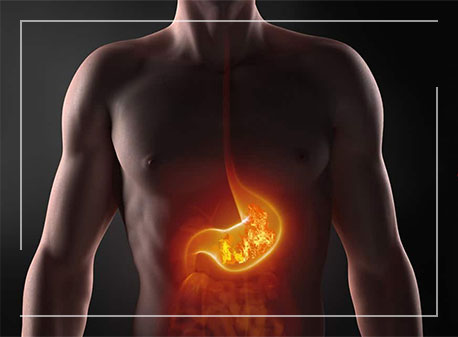What is heartburn? In simple terms, heartburn is a burning sensation felt behind the breastbone (chest) caused by stomach acid flowing back into the esophagus.
Occasional heartburn is common, but when it occurs frequently or severely, it may suggest an underlying condition like GERD (gastroesophageal reflux disease).
Medical sources, such as Mayo Clinic, explain that repeated exposure of the esophageal lining to stomach acid can cause damage, inflammation, and complications over time.
In this article, you’ll learn what is heartburn, its major causes, typical symptoms, and effective treatments you should know.
What is Heartburn?
Heartburn is a burning sensation in the chest or throat that occurs when stomach acid flows back into the esophagus (the tube connecting your mouth to your stomach).
This backward flow, known as acid reflux, irritates the lining of the esophagus and causes discomfort. It often feels worse after eating, lying down, or bending over, and while occasional heartburn is common, frequent episodes may signal a condition called gastroesophageal reflux disease (GERD).
What Causes Heartburn?
Heartburn occurs when the lower esophageal sphincter (LES), a circular muscle between the esophagus and stomach, fails to close properly or stays relaxed too long.
That allows acidic stomach contents to travel upward, irritating the esophageal lining. Several factors can cause this LES dysfunction, including a hiatal hernia, obesity (which increases abdominal pressure), and certain medications that reduce LES tension.
Dietary habits play a major role in triggering heartburn. Foods like fatty or fried meals, spicy dishes, citrus fruits, chocolate, caffeine, and alcohol are well-known culprits.
Overeating and eating late (close to bedtime) also make heartburn worse because the stomach is fuller and more likely to push contents upward when you lie down.
Other contributing causes include delayed gastric emptying (slower movement of food out of the stomach), smoking (which can weaken the LES), increased abdominal pressure (e.g. pregnancy), and certain medications (like calcium channel blockers, anticholinergics). These combined elements help explain what is heartburn on a physiological level.
Symptoms of Heartburn
The primary symptom of heartburn is a burning sensation behind the sternum, often rising toward the throat. Many people also report a sour or acidic taste in the mouth (acid reflux).
This discomfort typically shows up after meals, especially large or fatty ones, and may worsen when lying down or bending over.
Some patients experience additional symptoms beyond the chest burn. These can include difficulty swallowing (dysphagia), regurgitation (fluid or food coming up), chronic cough, throat irritation, hoarseness, or a feeling of a lump in the throat.
In severe or longstanding cases, esophageal damage may lead to bleeding, ulceration, strictures (narrowing), or precancerous changes like Barrett’s esophagus.
Because many of these symptoms overlap with other conditions (such as cardiac chest pain, asthma, etc.), correctly recognizing which signs align with what is heartburn is crucial. Persistent or alarming symptoms always merit medical evaluation.
How Is Heartburn Diagnosed?
Diagnosis often begins with a clinical evaluation: asking about symptoms, frequency, triggers, and response to over-the-counter medications. If symptoms are typical and uncomplicated, this may suffice.
In cases with alarm signs (difficulty swallowing, weight loss, bleeding), further testing is warranted. Common tests include upper endoscopy (to visualize the esophagus), esophageal pH monitoring, manometry (measuring esophageal muscle function), or barium swallow imaging.
Endoscopy can detect mucosal damage, inflammation, ulcers, or Barrett’s changes. PH monitoring helps quantify acid exposure in the esophagus, confirming the diagnosis in ambiguous cases.
Manometry can reveal motility disorders. These tools help doctors tailor treatment for what is heartburn when complications or atypical features exist.
Treatment Options for Heartburn
Lifestyle & Dietary Changes
First-line management often emphasizes modifying habits. Eating smaller, more frequent meals, avoiding trigger foods (fatty, spicy, citrus, chocolate, caffeine, alcohol), and not lying down within 2–3 hours after meals are effective strategies.
Elevating the head of the bed and maintaining a healthy weight can also reduce reflux episodes. Quitting smoking and reducing alcohol intake further support LES function.
Medications
Over-the-counter antacids (e.g., calcium carbonate) can neutralize acid quickly but offer only short-term relief. H2-receptor antagonists (e.g., ranitidine, famotidine) reduce acid secretion somewhat.
Proton pump inhibitors (PPIs) like omeprazole, lansoprazole, or esomeprazole are the most potent acid suppressors and are considered a frontline therapy for recurring heartburn or GERD. For many, PPIs relieve symptoms and allow inflammation to heal.
Advanced & Surgical Treatments
If symptoms persist despite medical therapy or complications occur, endoscopic or surgical interventions may be considered. Procedures like fundoplication (wrapping part of the stomach around the esophagus) strengthen the LES.
Some newer endoscopic methods aim to tighten the LES via sutures or implants. In severe cases, surgery may be the most durable solution for what is heartburn that fails medical management.
ALSO READ
Heartburn vs Acid Reflux vs GERD: What’s the Difference?
Final Takeaway
Understanding what is heartburn is the first step toward effectively managing it. While occasional acid reflux is common, frequent or severe symptoms should not be ignored.
With lifestyle adjustments, proper medication, and medical care when needed, most people can control heartburn, reduce esophageal damage, and live comfortably.
FAQs
How often is heartburn normal?
Occasional heartburn (once in a while) can be normal, especially after large or spicy meals. But if it occurs twice or more per week, interferes with daily life, or persists, it may indicate GERD and deserves evaluation.
Can heartburn damage my esophagus?
Yes. Frequent or untreated heartburn can lead to esophagitis (inflammation), ulcers, strictures (narrowing), and, in some cases, Barrett’s esophagus, a precancerous condition.
Are natural remedies effective for heartburn?
Natural aids like ginger, aloe vera juice, or chewing gum may help with mild symptoms by increasing saliva or neutralizing acid. But for persistent or moderate heartburn, they’re usually insufficient by themselves.
When should I seek medical help for heartburn?
See a doctor if heartburn comes with weight loss, bleeding, difficulty swallowing, chest pain, or if medications don’t relieve symptoms. These “alarm” features suggest complications that require medical testing.



Join The Discussion